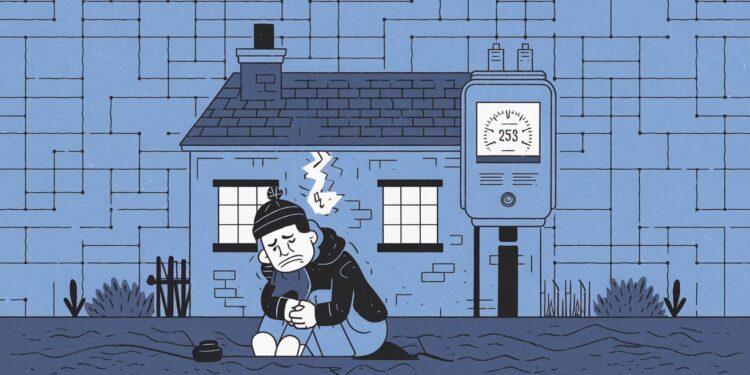As the icy grip of winter tightens across the United Kingdom, millions of vulnerable households are bracing for a bitter season of soaring energy costs. Those relying on prepayment meters—a pay-as-you-go system that disproportionately serves low-income families—could see their energy bills consume a staggering third of their incomes in the coming months.
Prepayment Meters: A Costly Burden for the Poor
Prepayment meters, which require users to pay for energy upfront, are heavily concentrated among Britain’s poorest households. A whopping 25% of the lowest-income families use this system, compared to a mere 1.5% of the wealthiest. This disparity sets the stage for a winter of hardship, as skyrocketing prices and plummeting temperatures collide.
Households on prepayment meters are set to spend almost a third of their family budgets on energy during the next three months. These high costs can squeeze out other important spending and increase the risk of people rationing their energy use in a way that can harm their health.
— Jonny Marshall, Principal Economist at the Resolution Foundation
The Perfect Storm: Rising Prices and Seasonal Demand
The Resolution Foundation, a prominent think tank, estimates that the 4 million households using prepayment meters will need to allocate more than 30% of their disposable income to energy bills over December, January, and February. This staggering figure is the result of several converging factors:
- Higher energy prices: Despite recent caps and government interventions, gas and electricity costs remain significantly elevated compared to previous years.
- Seasonal usage spikes: As temperatures drop, energy consumption naturally rises, further straining already tight budgets.
- Lack of smoothing: Unlike direct debit customers who can spread costs evenly, prepayment users face the full brunt of winter bills in real-time.
For many families, this trifecta of challenges could prove “unsustainable, leading to a risk of sitting in cold, dark homes,” warns the Resolution Foundation. The specter of energy poverty looms large, threatening the health and well-being of the nation’s most vulnerable.
The Specter of Energy Poverty
The burden of high energy costs falls heaviest on those least equipped to bear it. Prepayment meter households are more likely to reside in rented and poorly insulated homes, compounding the challenge of staying warm affordably. As families struggle to keep pace with rising bills, they may resort to dangerous coping strategies like rationing heat and power.
This is not a new crisis, but rather the continuation of a long-simmering affordability emergency. Prepayment meters have drawn criticism in the past for enabling suppliers to disconnect struggling customers or force them onto more expensive tariffs. A temporary ban on forced meter installations offered a reprieve, but the underlying issues persist.
Toward a More Equitable Energy Future
As winter’s chill descends, it is clear that more must be done to protect the UK’s energy-poor households. Short-term relief measures like the £150 Warm Home Discount and £300 Winter Fuel Payments provide a lifeline for some, but they are not enough to stem the tide of unaffordability.
In the longer term, a more sustainable and equitable energy future will require a multifaceted approach:
- Energy efficiency upgrades: Improving the insulation and heating systems of low-income homes can dramatically reduce costs and carbon emissions.
- Tariff reforms: Ensuring prepayment customers can access the best deals and are not penalized for their payment method.
- Income support: Providing targeted financial assistance to help the most vulnerable keep pace with rising bills.
The challenges ahead are daunting, but so too is the imperative to act. As the Resolution Foundation’s Jonny Marshall puts it, “For the million households on prepayment meters this winter, it will feel like the crisis never ended.” It is time for policymakers, energy suppliers, and society as a whole to ensure that no family is left out in the cold.








